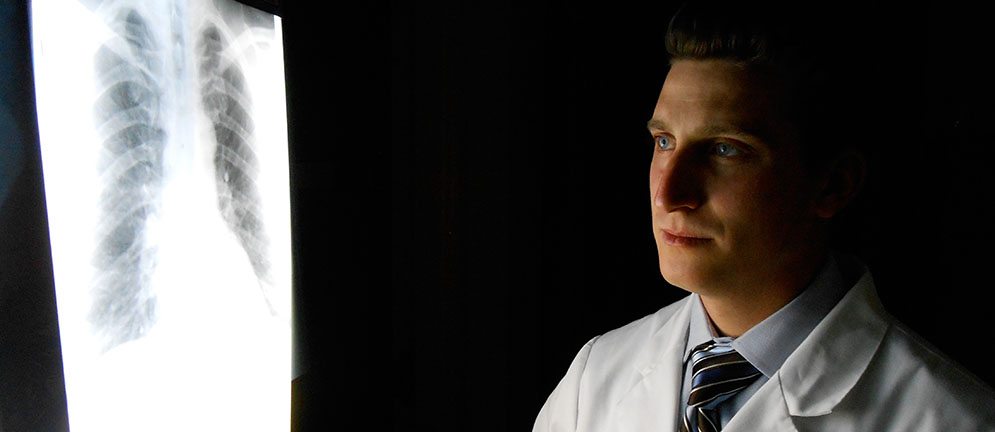
At a certain point in medical school you probably looked around and realized that being smart isn’t all that special. Most students are pretty smart. But what’s harder to find – and what leads to the highest levels of achievement – is a strong work ethic and character. Which brings me to Michael Talarico, an AUA student who recently matched in radiology at Dartmouth.
I first met Michael when I worked with EED in Antigua and he was the head TA. He remains the same person with a great sense of humor and a positive spirit who takes his responsibilities seriously. His father is a radiologist, so he says he grew up in dark rooms and spent a lot of time volunteering in radiology over the years. Still, he started med school with an open mind, thinking he might go in a different direction. It was only during rotations when he kept finding himself intrigued by radiology that he decided on radiology as his first choice specialty. His USMLE scores were not as high as the averages for that specialty, but he was more than able to compensate with his strong work ethic and personal qualities. The information below is based on an interview with Michael.
Students Helping Students
AUA students tend to rely on each other more than you’ll find at other schools. After fifth semester you’ll probably miss having more advanced students around, but you need to trust in your ability to self-study. Successful students listen to other students, but they ultimately find their own route.
Working as a TA at AUA
During my first year of med school, I benefited from one of the TAs who encouraged and helped me a lot. So I decided to pay it forward by becoming a TA myself. This experience molded my career as a med student. It taught me how to study and how to teach. It also helped build my work ethic. The moment you feel like someone else is depending on you, it changes you and instills a sense of responsibility. The faculty trusts you and the students depend on you. You are not going to let them down.
Being involved in the TA program at AUA is also a big advantage for residency application. During interviews when they asked me about myself, I would always mention loving to teach, along with a few other qualities. They often asked a lot of questions about my TA experience. There’s a big focus on teaching during residency, so being a TA was a definite asset.
U-World Delusions
If you go through U-World questions a second time, you will probably start thinking that you’re doing really well and are prepared for whatever step exam you’re studying for. However, this may be because you’re recognizing every fifth question or so. Later, when you’re taking the actual exam, you won’t recognize every 5th question and it can create a lot of anxiety in an already stressful situation. For this reason, question banks should only be considered a relevant score predictor if you have never seen the questions.
Turning up the Heat
Pick a date for your USMLE exam and work toward that date. The most intense studying you do will be in the last 3 weeks before your exam. Setting a date for your exam changes your drive and motivation. Nothing makes a student study harder than the sense of impending doom a USMLE exam provides!
C.D.: I agree with Michael, although I would add that you should give yourself the option to bail out on this testing date if you have evidence shortly before the exam that you’re not as ready as you thought you would be. Also, if you get sick on the morning of your exam, remember this: If you don’t show up at Prometric, you will lose the money for the exam, but this will not appear on your records as a testing attempt.
Getting the Most from an Audition Rotation
I did an audition rotation at a hospital with a strong radiology program, and during that rotation I would always arrive two hours early and leave two hours late. I also spent a lot of time hanging out with residents in the program. Whenever we came across an interesting case, I’d ask if they would mind if I did some research to see if I could find cases that were similar. I always tried to do a really thorough job with my research. At a certain point I might also ask a colleague if they were interested in collaborating on an article or a conference presentation. For one case, I ended up presenting to about 45 doctors, and it was kind of a shock when they started directing their questions to me, rather than another doctor. As a result of this work, I was able to get an LOR from a highly respected radiologist. During residency interviews, that letter was usually the first thing the interviewer mentioned. By the way, be sure you opt out of seeing your LORs! The reason you would want to see the letter is the same reason it looks bad if you do. If you don’t trust the attending enough to write a good letter, don’t ask that attending.
A Phone Call Vouching for You
Interviewing for residency is basically the Hunger Games of Medicine and there is no greater lifeline during the process than a phone call vouching for you – a person who’s so impressed with you that he’s willing to call a friend at a residency program and say something like this: “Look, I know you wouldn’t normally look at this guy, but his work ethic and his …” To get that kind of phone call, you need to remember that everybody is watching you during your rotations and you need to excel.
Residency Interviews
I applied to 137 programs and got 23 interview invitations (I went to 19). I was applying in 4 different specialties and at times during interviews I felt like a chameleon. But I loved aspects of each specialty and I would highlight that. The interviews varied a lot, from those that were trying to get to know me as a person to those asking tougher questions. In internal medicine, I noticed that some of the less competitive programs asked tougher questions. Several programs asked ethical questions such as what I would do if I saw a superior resident making a mistake. I was also asked: How would you give bad news? Tell me about a time when you were wrong and too proud to admit it. One thing to remember during the whole process is that program coordinators are really important. They can’t decide who will get in, but they can decide who won’t.
Wanting it Enough
I was doing a rotation in Nebraska during interview season, and unfortunately my interview at Dartmouth ended up being scheduled during a huge snowstorm along the East coast. All the flights were cancelled, including mine. But I decided I was not going to miss an interview at Dartmouth, so I got in my car and drove from Nebraska to New Hampshire. And that was how I was introduced to everybody I met – as the guy who drove to the interview from Lincoln, Nebraska. I was never asked about my USMLE scores during interviews in radiology. They were more interested in my personal qualities and whether I’d be a good fit. Once you are granted an interview, the programs know your credentials and it is more of a search for colleagues that would “match” their programs in personality and direction, not who is going to keep a USMLE average over 250.
Message to Current Clinical Students
I know that for those of you who will be matching in 2015, it probably feels like it’s fast approaching, yet surreal at the same time. I am very excited for all of you during this amazing time in your medical school careers. The best overall advice I can give when applying to residency is to apply VERY broadly, have a back up plan (applying to a less competitive specialty if applicable), be shameless (now is the time to call upon your friend’s uncle’s cousin for that letter he promised you 10 years ago), do NOT fear rejection (if you are not getting rejection letters you did not aim high enough), and lastly, be humble (you will be self-reflecting for months, I promise you).
Once again, I am very excited for all of you. I am always so impressed with the drive and dedication I see from my classmates at AUA. We are a tight knit student body and that makes us unique. I am honored to be graduating with such an amazing 2014 class and I look forward to hearing about how future classes go farther than even we could imagine. Best of luck to all of you future doctors, colleagues and friends!







